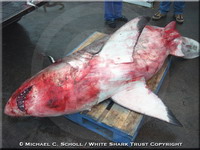International body to limit commercial fisheries and timber
The international body overseeing wildlife trade will consider limitations on commercial fisheries and timber, and may regulate such species as the shark popular in fish and chips and the aromatic cedar tree used for fine furniture and humidors.

The ongoing struggles to control elephant poaching and to protect tigers from extinction are also on the agenda of the 12-day meeting of the 171-nation Convention on International Trade in Endangered Species.
CITES, a treaty that came into force in 1975, will wade into commercial issues as never before, hoping to intervene before species' survival reaches a serious level of risk, said its secretary general, Willem Wijnstekers.
Until now, CITES has stepped in "at a far too late stage, when the species were already or almost commercially extinct," he said, referring specially to timber like mahogany.
The conference will consider a European proposal to regulate the trade in the spiny dogfish, a small shark exploited for the fast food business, and the porbeagle, another shark valued for its meat and fin. Both sharks grow slowly, mature late and have few young.
Another proposal would help protect sawfish, with a famously serrated snout, which are popular acquaria items and are also exploited as food.
The United States and Canada, which are among the world's top three exporters of spiny dogfish, have signaled they may oppose the proposal, as has New Zealand, said Sonia Fordham, of Oceans Conservancy in Washington, D.C.
Proposals need a two-thirds majority of voting countries. Nongovernment organizations may present papers, speak at meetings and lobby delegates, but cannot vote.
"We've got a tough battle ahead of us. We think it's still winnable, but the sharks will be one of the biggest battles of the conference," said Carroll Muffett, of the Greenpeace environmental movement.
"This is about more than sharks. It's about the future of commercially valuable fisheries within CITES," Muffett said.
The conference will also consider listing the Spanish cedar, a tropical hardwood from South America prized for its salmon-colored wood used in cabinets, musical instruments and the aromatic lining of cigar boxes. Conservationists say loggers are stripping national parks and protected areas in several countries, specially Peru.
Other proposals would limit trade in the wood of the brazilwood tree, from which high-end bows are made for stringed instruments. Protection also would be increased for several species of gazelles.
CITES lists more than 7,000 animals and 32,000 plants whose trade is regulated, including about 800 highly threatened species that are banned from commercial trade without special licenses.
Addressing the 1,750 delegates, Wijnstekers supported a proposed resolution calling on CITES to consider the livelihood of the people who live closest to wildlife - often the rural poor in developing countries - while enforcing the protection of endangered species.
Species must be listed according to scientific data, he said, "but implementation of the relevant trade regime should take the interests of the livelihood of the poor into account."
"Wildlife species are fundamental to livelihoods and economic growth," he said. "I attach great importance to the role CITES can play in this context, and I find it unfortunate that this role is being denied by some."
Some nongovernment organizations object to the resolution, saying it deflects CITES from its original mandate of rescuing vulnerable plants and animals.
"There are any number of agreements and treaties that deal with the human condition, but precious few that focus on species," said Will Travers, chairman of the Species Survival Network, a coalition of about 80 wildlife protection agencies.
On Saturday, CITES' 18-member Standing Committee, which meets annually, approved the sale by three southern African countries of 60 tons of ivory from national stocks to Japan, in a one-time exception to a 1989 trade ban.
The ban was credited with helping elephant herds recover in South Africa, Namibia and Botswana, which imposed strict management schemes. The decision to let the sale go through was denounced by some conservationists who said it could serve as a cover for illegal ivory and encourage poaching in West and Central Africa.
The full conference will discuss measures to stiffen protection for elephants, tigers, whales and great apes.
Subscribe to Pravda.Ru Telegram channel, Facebook, RSS!




